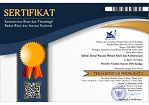The urgency to reform the kafāla system in the sake of human rights of Indonesia domestic workers
Abstract
The Maṣlaḥa of Indonesian Foreign Domestic Workers in Saudi Arabia still become the biggest concern. Even though Saudi Arabia has reformed the Labor Law on the kafāla system, unfortunately, it is excluded from Foreign Domestic Workers. Therefore, it urges legal research to examine the kafāla system in Saudi Arabia from an Islamic and human rights perspective. Then, to provide the strategic plans for the Indonesian government to do. This research uses doctrinal research methods through the literature study and analyzed with the qualitative descriptive method. From the Islamic law perspective, although the kafāla system in Saudi Arabia is derived from the Qur'an and the Sunnah. Kafāla system in Saudi Arabia is regulated on Resolution no. 310. However, in practice, Kafil abuses their strong position (83. QS. Al-Mutaffifin) in treating workers arbitrarily. In other words, there is a deviation from the philosophical values of maqāṣid ash-syarīʿah. From the international law perspective, this practice is against the mandate of the UDHR and ICCPR. Therefore, it is highly recommended that Indonesia push Saudi Arabia to replace individual sponsorship as Kafil for Indonesian Domestic Workers. It is better to establish a special guarantee institution for Domestic Workers from Indonesia in Saudi Arabia integrated with the SPSK System.
Keywords
Full Text:
PDFReferences
Al-Ghanim, K. (2015) “Kafāla System Remains Resilient in the GCC,” in Al-Atiqi, S. (ed.) Gulf Affairs: Labor Market Dynamics in the GCC States. Autumn 2015. Oxford: OxGAPS Forum, pp. 6–8.
AlShehabi, O.H. (2021) “Policing labour in empire: the modern origins of the Kafāla sponsorship system in the Gulf Arab States,” British Journal of Middle Eastern Studies, 48(2), pp. 1–20.
Alzahrani, M.M. (2014) “The System of Kafāla and the Rights of Migrant Workers in GCC Countries – With Specific Reference to Saudi Arabia,” European Journal of Law Reform, 19(6), pp. 171–194.
Asia Pacific Mission for Migrants (2014) The Kafala: Research on the Impact and Relation of the Sponsorship System to Migrant Labor Bondage in GCC Countries. September 2014. Edited by R. Bultron. Hong Kong SAR: ASIA PACIFIC MISSION FOR MIGRANTS.
Azhari, A. (2016) “The Kafāla Sponsorship System In Saudi Arabia: A Critical Analysis From The Perspective of International Human Rights And Islamic Law,” The SOAS Journal of Postgraduate Research, 10, pp. 61–80.
Baldwin-Edwards, M. (2011) “Labour immigration and labour markets in the GCC countries: national patterns and trends,” LSE Kuwait Programme Research Paper, 15, pp. 1–65.
Dahlan, Z. et al. (1999) Filsafat Hukum Islam. 3rd edn. Jakarta: Bumi Aksara.
Diop, A., Johnston, T. and Le, K.T. (2015) “Reform of the Kafāla System: A Survey Experiment from Qatar,” Journal of Arabian Studies, 5(2), pp. 116–137.
Foster, N.H.D. (2001) “The Islamic Law of Guarantees,” Arab Law Quarterly, 16(2), pp. 133–157.
Hanif, A. (2019) “Akad Kafālah Dalam Perspektif Filsafat Ditinjau dari Asas Kemaslahatan,” Tahkim: Jurnal Hukum dan Syariah, 15(1), pp. 88–97.
Human Right Watch (HRW) (2021) Saudi Arabia: Labor Reforms Insufficient Abusive Elements Remain; Changes Exclude Domestic Workers.
International Labour Organization (ILO) (2019) Regulatory Framework Governing Migrant Workers, International Labour Organization (ILO).
International Trade Union Confederation (ITUC) (2017) Facilitating Exploitation: A review of Labour Laws for Migrant Domestic Workers in Gulf Cooperation Council Countries. Brussels.
al Jazeera (2020) “Saudi Arabia to remove key restrictions on foreign workers,” 4 November.
al Jazeera (2021) “Saudi Arabia announces changes to Kafāla system,” 14 March.
Jureidini, R. and Hassan, S.F. (2020) “The Islamic Principle of Kafāla as Applied to Migrant Workers: Traditional Continuity and Reform,” Migration and Islamic Ethics, 2(Residence, Naturalization and Citizenship), pp. 92–109.
Kirom (2021) “Kisah Pilu Arini, Dilecehkan dan Diperjualbelikan Majikan Saat jadi TKW di Saudi,” Merdeka.com, 19 May.
Kurniawan, E. (2018) “Distorsi Tehadap Maqāṣid Al-Syarīʿah Al-Syāṭibī Di Indonesia,” Al-Risalah: Forum Kajian Hukum dan Sosial Kemasyarakatan, 18(2), pp. 175–194.
Lloyd, W.H. (1917) “The Surety,” University of Pennsylvania Law Review and American Law Register, 66(1), pp. 40–68.
Malaeb, H.N. (2015) “The ‘Kafala’ System and Human Rights: Time for a Decision,” Arab Law Quarterly, 29(4), pp. 307–342.
Migrant Forum in Asia (MFA) (2012) Policy Brief No. 2: Reform of The Kafāla (Sponsorship) System. Phillipines.
Murray, H.E. (2012) “Hope for Reform Springs Eternal: How the Sponsorship System, Domestic Laws and Traditional Customs Fail to Protect Migrant Domestic Workers in GCC Countries,” Cornell International Law Journal, 45(2), pp. 462–485.
Okezone (2021) “Sistem Kafāla di Arab Saudi, Ratusan TKI Hilang Kontak dari Keluarga,” Okezone.com, 20 March.
Putranto, P.D. (2018) “Kisah Sumiyati, TKI dari Grobogan yang Tewas Dianiaya Majikannya di Arab Saudi ,” Kompas.com, 11 January.
Robinson, K. (2021) What Is the Kafala System?, Council on Foreign Relations.
Shaham, D. (2008) “Foreign Labor in the Arab Gulf: Challenges to Nationalization,” Al Nakhlah: The Fletcher School Online Journal for Southwest Asia and Islamic Civilization, (Fall), pp. 1–13.
Silvey, R. and Parreñas, R. (2020) “Precarity chains: cycles of domestic worker migration from Southeast Asia to the Middle East,” Journal of Ethnic and Migration Studies, 46(16), pp. 3457–3471.
Sönmez, S. et al. (2011) “Human rights and health disparities for migrant workers in the UAE,” Health and Human Rights: An International Journal, 13(2).
Suhendi, H. (2002) Fiqh Muamalah. Jakarta: Raja Grafindo Persada.
Wehr, H. (1994) A Dictionary of modern written Arabic. 4th edn. Edited by J.M. Cowan. Ithaca: Spoken Language Services.
Winckler, O. (2010) Labor Migration to the GCC States: Patterns, Scale, and Policies, Middle East Institute.
DOI: https://doi.org/10.18326/ijtihad.v21i2.213-230
Refbacks
- There are currently no refbacks.

This work is licensed under a Creative Commons Attribution-ShareAlike 4.0 International License.
Ijtihad: Jurnal Wacana Hukum Islam dan Kemanusiaan by http://ijtihad.iainsalatiga.ac.id/ is licensed under a Creative Commons Attribution-ShareAlike 4.0 International License








